The College Press NIV Commentary: Old Testament (CPNIV) (23 vols.)
Digital Logos Edition
Overview
The College Press NIV Commentary series delivers verse-by-verse explanation of the biblical text that’s as informative as it is accessible. Each volume begins with a descriptive introduction then dives into a detailed explanation of the book, bringing together top-notch biblical scholarship and the clarity of the most popular modern translation of the Bible.
The College Press NIV Commentary series caters to a broad readership; from the ivory tower to the pulpit to the pew. The scholar will find a dedication to serious exegesis, with constant appeals to original language texts and dialogue with the interpreters of the past. The pastor will discover a wealth of sermon material, as the series’ verse-by-verse exposition is sensitive both to the texts’ ancient context and Christian application. Like the NIV text that it’s based on, this series is characterized its readability, making it perfect for all levels of personal Bible study.

- Provides verse-by-verse exposition on the Old Testament
- Discusses translations of the original text and interpretations
- Applies the principles of the text to a contemporary perspective
- Includes practical and extensive footnotes
- Title: The College Press NIV Commentary Series: Old Testament
- Series: College Press NIV Commentary (CPNIV)
- Publisher: College Press
- Volumes: 23
- Pages: 10,390
- Christian Group: Evangelicals
- Resource Type: Commentaries
- Topic: Old Testament
- Old Testament Introduction by Mark Mangano
- Genesis, vol. 1 by Paul J. Kissling
- Genesis, vol. 2 by Paul J. Kissling
- Exodus by Randall C. Bailey
- Leviticus-Numbers by Clyde M. Woods and Justin M. Rogers
- Deuteronomy by Gary Hall
- Joshua by Mark S. Ziese
- Judges & Ruth by Rob Fleenor and Mark S. Ziese
- 1 & 2 Samuel by James Smith
- 1 & 2 Kings by Jesse C. Long
- 1 & 2 Chronicles by John Mark Hicks
- Ezra & Nehemiah by Keith Schoville
- Esther & Daniel by Mark Mangano
- Job by Stephen M. Hooks
- Psalms, vol. 1 by Edward Tesh and Walter Zorn
- Psalms, vol. 2 by Walter Zorn
- Proverbs, Ecclesiastes, Song of Solomon by Dave L. Bland
- Isaiah, vol. 1 by Terry Briley
- Isaiah, vol. 2 by Terry Briley
- Jeremiah & Lamentations by Tim Willis
- Ezekiel by Brandon L. Fredenburg
- Minor Prophets, vol. 1 by Harold Shank
- Minor Prophets, vol. 2 by Clay Alan Ham and Mark Allen Hahlen
This title is included in the following collections
You can save when you purchase this product as part of a collection.
College Press NIV Commentary (...
$744.58$549.992025 Leader Gold Library
$849.99$679.992025 Charismatic Gold
$849.99$679.99Nuevo Comentario Americano del...
$927.99$927.99
- $1,499.99$1,199.99
- $1,499.99
- $1,499.99
- $2,999.99$2,249.99
- $2,999.99
- $2,999.99
- $2,999.99
- $2,999.99
- $2,999.99
- $2,999.99
- $4,749.99$3,562.49
- $4,749.99
- $4,749.99
- $4,749.99
- $4,749.99
- $4,749.99
- $10,999.99$8,249.99
- $11,399.99
- $23,999.99$17,999.99
- $21,749.99
- $24,999.99

This volume focuses on each individual book of the Old Testament and gives specifics on their authorship, date and purpose. The Old Testament Introduction provides an excellent starting point for any in-depth Bible book study or exegesis.
Mark Mangano served as an instructor at Cincinnati Bible Seminary from 1987 until 1990 when he joined the faculty at Minnesota Bible College as professor of Bible. He is now professor of Old Testament at Lincoln Christian University. Mangano received a BA from Minnesota Bible College, a MA from Trinity Evangelical Divinity School, and a MPhil and PhD from Hebrew Union College.

The first book of the Old Testament speaks of beginnings. It functions as the introduction to the Pentateuch and is foundational to the understanding of the rest of the Bible. Genesis explains how the people of Israel arose and were called to be God’s people. The nation to which the Pentateuch is addressed is about to enter the Promised Land. There they will face the culture and religion of the inhabitants of Canaan. The polytheistic nature religion of the Canaanites is a great temptation to Israel, and the laws recorded in the Pentateuch are designed to prevent Israel from falling into the destructive patterns of life present in Canaan.
Paul J. Kissling received a BA from Great Lakes Christian College, MDiv from Lincoln Christian Seminary, ThM from Trinity Evangelical Divinity School, and PhD from the University of Sheffield, England. Dr. Kissling has served as professor of Old Testament and director of research for TCM International’s Institute near Vienna, Austria. He is now the vice president of academic affairs at Dallas Christian College. He has served for over 25 years as a minister and elder in Christian churches in Michigan, Illinois, and England. Paul has taught and preached in more than 20 countries and is the author of several books and articles in both scholarly and popular publications.
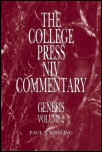
Genesis is not merely an Old Testament book. Genesis is the beginning of the Bible’s macro-narrative, the over-arching narrative which stretches from the creation in Genesis 1 and 2 to the new creation in Revelation 21 and 22. To read Genesis as Christian Scripture requires that we also read Genesis in light of its meaning for Christians who know Jesus Christ to be the ultimate seed of Abraham (Gal. 3:16).
This section of Genesis deals with the chosen family, the precursor to the nation of Israel. It focuses much more on the lives of individual characters who come to life on its pages. A predominant theme in this section of Genesis is the concept of election or “chosenness,” referring to God’s choice of particular individuals as the human channels of his blessing to the entire world. Often God’s choice runs counter to the human choice. Isaac is chosen over Lot and Ishmael; Jacob over Esau; Judah over his older brothers Reuben, Simeon and Levi. Joseph, the tenth son, is elevated above his brothers. The chosen nation descends from a series of individuals chosen for reasons other than their order of birth or expected social status. Israel is a chosen nation descended from God’s unlikely choices. The theme of God’s surprising choices binds the narratives of Genesis together and highlights at the humility that the chosen nation Israel must have toward their own election.
In this section of Genesis we have full-fledged characters such as Abraham and Sarah, Isaac and Rebekah, Jacob, Joseph, and Judah with complex narrative portrayals. The lessons we learn from them come as much from their weaknesses and mistakes as it does from their moral examples. The characters of Genesis are not white-hatted heroes riding white horses or black-hatted villains riding black ones. The message of Genesis is not simplistic moralizing.
Genesis 12–50 makes clear that even the chosen family is itself significantly sinful. This prepares the ground for the Bible’s great surprise ending. God himself, in his son Jesus the Messiah, the son of David, the son of Abraham, took on flesh and brought the answer “Yes” to all God’s promises (2 Cor. 1:20).
Paul J. Kissling received a BA from Great Lakes Christian College, MDiv from Lincoln Christian Seminary, ThM from Trinity Evangelical Divinity School, and PhD from the University of Sheffield, England. Dr. Kissling has served as professor of Old Testament and director of research for TCM International’s Institute near Vienna, Austria. He is now the vice president of academic affairs at Dallas Christian College. He has served for over 25 years as a minister and elder in Christian churches in Michigan, Illinois, and England. Paul has taught and preached in more than 20 countries and is the author of several books and articles in both scholarly and popular publications.
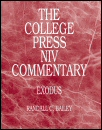
The book of Exodus functions as the sequel to Genesis describing God’s deliverance of the children of Israel and the establishment of a new covenant between God and Israel. The rest of the Old Testament looks back on the exodus of Israel from Egypt as the primary redemptive event in Israel’s history.
This primary redemptive event became central to the Hebrew Bible and the New Testament. God’s redemption of Israel became the foundation for the Israelite faith and proactive reflected in the many Old Testament allusions to the exodus as the basis for:
- Obedience to the covenant
- Proper ethical treatment of others
- The establishment of the sovereignty of God
- A national dateline marking the nation’s history
- A standard for the measurement of all subsequent events
For the Christian, Exodus serves similar functions, pointing to the important work of redemption as seen in the New Testament’s record of the death, burial, and resurrection of Jesus Christ. This perspective significantly impacts the hermeneutical foundation and message of this commentary.
The reader with a good understanding of both the Old and New Testaments sees in the exodus God’s deliverance of Israel foreshadowing the death of Christ and the establishment of the church. The Christian’s appreciation of the work of Jesus in mankind’s salvation is understood and appreciated in a ratio equal to the understanding of the messages and themes of the exodus and the book which bears its name.
Randall C. Bailey is professor of Bible at Faulkner University in Montgomery, Alabama. He received his BA, MA, GSRE, and MTh from Amridge University, and his MPhil and PhD from Drew University.
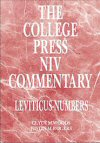
The key theological concept of Leviticus is holiness. The phrase “holiness to the Lord” occurs approximately 150 times in the book. Thus, there is no doubt that the theology of Leviticus is a question of holiness. Whenever Israel is holy, they enjoy the state of purity, cleanness, and harmony with God. Whenever they are unholy, they are impure, unclean, and victims of cosmic chaos.
The Lord calls for loyalty to the new covenant just as he calls for obedience to the Mosaic legislation. The call for purity among the Lord’s people and single allegiance to his will still resonates, and Christians can learn from Leviticus to reverence the sacred space within their hearts created by the presence of their sovereign holy Lord. As priests ourselves among God’s holy spiritual house, the church, we are called upon “to be a holy priesthood, offering spiritual sacrifices acceptable to God through Jesus Christ” (1 Pet. 2:5) and even to consider our bodies “as living sacrifices, holy and pleasing to God” as our “spiritual act of worship” (Rom. 12:1). In different frame then, Leviticus can instruct us concerning human sinfulness and God’s gracious provision for atonement, healing, and hope so that we can truly be “a chosen people, a royal priesthood, a holy nation, a people belonging to God,” fit for God’s holy and sacred presence within us (1 Pet. 2:9).
Many have said that in order to preach and teach effectively from the New Testament, you must have a grasp of Leviticus.
The theme of Numbers is the wilderness experience of Israel. The trek from Sinai to Canaan that should have required but a few months at most was extended by the people’s disobedience to a period of nearly forty years, a time that allowed the passing of one generation and the maturation of the next one.
The message of Numbers involves promise and hope but, for the most part, it is hope deferred and promise delayed. While two generations of Israelites do come into focus in the book, by any reckoning the greater stress is on the first of these, the rebellious generation that witnessed the miracles of the Exodus, received the Lord’s instruction at Sinai, and departed enthusiastically to go to Canaan, only to see their robust optimism melt in the desert heat and the other harsh realities of the wilderness.
Dr. Clyde M. Woods is professor of Bible at Freed-Hardeman University, Henderson, Tennessee where he teaches undergraduate and graduate courses in Bible and biblical languages. He holds degrees from Memphis State University, 1956; AA, Freed-Hardeman College, 1957; BA, Abliene Christian College, 1958; MA, Harding College Graduate School of Religion, 1959; MRE, MTh, Harding College Graduate School of Religion, 1961; PhD, Hebrew Union College, 1965; and Hebrew Union College, 1971. Dr. Woods has authored several books and has contributed numerous articles for print and presentation at various Christian college lectureships.
Justin M. Rogers is the author of several articles. He holds bachelors and masters degrees from Freed-Hardeman University, and is currently pursuing a PhD.

Deuteronomy has been a controversial book for at least the last 120 years. At that time what is known as the critical school developed which insisted that the book could neither have been written at the time of the exodus and wandering nor could it have been written by Moses. Hall has cogently and thoroughly defended the conservative position which holds to the traditional view which the book claims for itself. By carefully delineating the structure of the book both holistically and in many disputed passages, he demonstrates that Deuteronomy was originally a single piece of legal history, not a hodgepodge of writings from various times in Israel’s history put together by a series of editors in the years after the exile.
Gary H. Hall attended Minnesota Bible College, Eastern Christian College, and graduated from Milligan College. He earned a MDiv from Lincoln Christian Seminary with majors in Old Testament and Theology, a MTh from Gordon-Conwell Theological Seminary in New Testament, and a PhD in Old Testament from Union Theological Seminary.
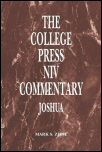
The Law of Moses asks and answers questions essential to the reading of Scripture. Some of these questions are launched upwards: Who is Yahweh? What are his expectations? Other questions are launched outwardly: Who is this Moses? What are his credentials? Yet other questions are launched inwardly: What does it mean to be the people of God? Far more than a mishmash of short stories, endless genealogies, and odd rules; torah makes specific claims about the nature of Yahweh, Moses, and the people of God. Like any living document, it must be remembered, interpreted, and applied afresh by each generation.
The book of Joshua attempts to do just this. Scripturally, it connects onto the end of the Torah, offering the story of the first generation to venture beyond the scraps of Mt. Nebo where the tracks of Moses stop abruptly, then disappear. For the exodus generation, and indeed for Moses himself, a visit to this land of promise could only be appreciated vicariously, unless, of course, one were to include a deep-down ache for a place to call home. For the Eisodos generation, on the other hand, the promise would finally become reality. To fully appreciate their position, though, the words of torah and its stories of men whose feet trod this land centuries earlier must be remembered. By the late second millennium BC, the trail of these early walkers is already old, but not yet cold; Torah retrieves the pathways of Abraham, Isaac, and Jacob. Beyond the task of remembering, the text of Joshua will also interpret torah.
Mark S. Ziese is professor of Old Testament, Cincinnati Christian University. Dr. Ziese received his BA from Ozark Christian College; MA from Cincinnati Christian University; MA from Hebrew Union College; and his PhD from Andrews University.
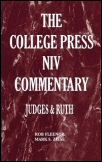
In the immediate context of the Old Testament, Judges forms a link between the exodus of the Hebrews from Egypt and the rise of the Jewish monarchy. The period reflected in Judges is crucial to the development of the Israelite psyche as God begins the lesson that the exiles to Assyria and Babylon later finish: blessing is connected to fidelity to God; suffering is the natural consequence of disobedience.
The stories in Judges are exciting, well-told tales of intrigue, suspense, seduction, violence, revenge, and triumph. Through them all, the hand of the God of Israel moves—sometimes obviously and sometimes furtively—to teach his people their need for him.
The charm, even mystique, of the book of Ruth rests in the ability of the narrative to suggest the work of God in the midst of ordinary life. Ruth is shown to be a personal example of faithfulness. She exceeds all the expectations of her society and perhaps even the letter of the law.
The message of the book of Ruth may be considered from at least two vantage points. Viewed in strictly human terms, it underlines the importance of persistent and faithful relationships in moments of crisis. Viewed from a faith perspective it communicates confidence in the ongoing work of God to fill the empty, to protect the vulnerable, and to bring joy into a grieving world. In a small way, Ruth’s story anticipates that which is only fully realized on this side of the cross.
Rob Fleenor has taught Old Testament courses at Cincinnati Christian University and has served in rural ministry in Deerfield, Missouri, and in inner-city ministry in Cincinnati, Ohio. He received a BTh and BBL from Ozark Christian College, and an MA from Cincinnati Christian University. Currently he is pursuing a PhD in biblical studies at Asbury Theological Seminary.
Mark S. Ziese is professor of Old Testament, Cincinnati Christian University. Dr. Ziese received his BA from Ozark Christian College; MA from Cincinnati Christian University; MA from Hebrew Union College; and his PhD from Andrews University.

The immediate purpose of the Book of Samuel was to narrate the circumstances surrounding the founding of the monarchy in Israel with Saul, the fascinating relationships between Saul and David, and David’s rise to the throne. First Samuel narrates the expansion of the kingdom of Israel into an important power. Second Samuel deals with the covenant with David, his sin and fall from favor, and the disciplines he received for those sins.
James E. Smith received his undergraduate and seminary training at Cincinnati Bible Seminary. He received a PhD at Hebrew Union College-Jewish Institute of Religion. Dr. Smith has served congregations in Ohio and Kentucky. For 13 years he was professor of Old Testament at Cincinnati Bible Seminary. He currently serves Florida Christian College as chairman of the division of biblical studies.

1 and 2 Kings tell of David’s death, the golden age of Solomon’s reign, how the nation divided into two kingdoms, and their eventual captivity by heathen powers. Solomon, David’s son, began his rule with great wealth, glory, and power, but it ended in disgrace.
The spiritual condition of Israel was of paramount importance to the writer amidst political changes. The author of Kings holds up the history of Israel and Judah before the captives to teach them that the only way to freedom is to repent of idolatry, return to God, keep the covenant, and trust in the divine promises. He seeks to awaken in them a conviction of the truth of this teaching and to strengthen them in this conviction.
Jesse C. Long is dean of the college of biblical studies and behavioral sciences and professor of Old Testament and biblical archaeology at Lubbock Christian University. He received his BA from David Lipscomb College, his MA from Alabama Christian School of Religion, his MEd from Georgia State University, his MPhil from Drew University, his MA (Syro-Palestinian Archaeology), and his PhD (Old Testament) form Drew University.

John Mark Hicks has given us a clear vision of God’s desire for his people through the eyes of the chronicler. The message repeated again and again throughout Chronicles and this commentary is, “God seeks those who seek him; God forsakes those who forsake him.” Just as the chronicler applied the meaning of God’s promises to his own context, so Hicks challenges us to apply the meaning of these same promises to our context.
John Mark Hicks has been professor of theology at Lipscomb University in Nashville, Tennessee since 2000. Prior to his current position he most recently taught in Memphis, Tennessee, at Harding University Graduate School of Religion and Magnolia Bible College, Kosciusko, Mississippi. Hicks received his BA from Freed-Hardeman College, MAR from Westminster Theological Seminary, MA from Western Kentucky University and PhD from Westminster.

Ezra and Nehemiah are considered some of the “historical” books of the Bible, for in them we get a glimpse of life in Israel after the exile in Babylon. Dr. Schoville identifies these as the Ezra Memoirs and the Nehemiah Memoirs. It is his belief that the first-person material in these books was probably written around 400 BC, while an editor compiled these memoirs with other sources around 300 BC, after the conquest of Alexander the Great.
Keith Schoville is professor emeritus at the University of Wisconsin-Madison. Prior to his current position he was professor of Hebrew and Semitic studies at UW-Madison, 1970–1995, and instructor of Hebrew and Semitic studies at UW-Madison from 1968–1970. Dr. Schoville received his BA from Milligan College in 1956, his MA from the University of Wisconsin in 1966, and his PhD from the University of Wisconsin in 1969.

Through fasting, prayer, and confession both Esther and Daniel discover the tenacious resolve of faith, its uncompromising purity, and the security of its shelter. These are a man and woman of faith. They challenge us to follow their lead. Dr. Mangano examines these two wonderful books and provides evidence of how the Hebrew God cares for his people and ultimately his church.
Mark Mangano served as an instructor at Cincinnati Bible Seminary from 1987 until 1990 when he joined the faculty at Minnesota Bible College as professor of Bible. He is now professor of Old Testament at Lincoln Christian University. Mangano received a BA from Minnesota Bible College, a MA from Trinity Evangelical Divinity School, and a MPhil and PhD from Hebrew Union College.
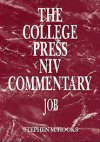
The book of Job is a “God-book” from cover to cover. God is the subject or the subject-behind-the subject of every page. Through its compelling plot and exalted speeches the book of Job explores the mystery of God’s ways to a depth and with an intensity that is unsurpassed in all of ancient religious literature.
Job has the power to engage its readers on different levels. Intellectually, it forces the reader to rethink traditional theories of divine justice by exposing the inadequacy of the simplistic, fatalistic doctrine of retribution. Emotionally, it stirs feelings of sympathy, anger, frustration, sorrow, and even laughter over its surprising plot and ironic language. Spiritually, it calls the believer to a new and higher kind of piety a piety that trusts God in spite of life’s cruel absurdities and loves God simply for who he is. It invites the reader, like Job, on a journey of faith that ends with an unexpected and life-transforming encounter with the sovereign Lord of the universe.
The book of Job stands apart from parallel literature in several ways. First, of course, is its unique theology. The monotheistic perspective of Job posed a special problem for the author’s consideration of the role of God in human suffering. No other ancient work goes as far as Job does in its search for an answer to the problem of theodicy. Its challenge to retributive justice as the sole model by which to understand how God governs his world is unapproached by any other ancient work. Second, the book of Job stands out as literature. Its characterization and employment of its protagonists, its balancing of lament and substantive debate, its blending of religious tradition and wisdom, and its powerful use of lyrical poetry are all without peer in the ancient literature. Finally, the book of Job surpasses its ancient parallels in the lasting influence it has had in human intellectual history, especially on the thinking of the Western world.
The book of Job also makes important contributions to our understanding of the faith of ancient Israel. The story of Job’s undeserved suffering and his search for the meaning of God’s role in it gives rise to a theological discussion that is as provocative as it is profound. Some of the issues explored by the book, though addressed elsewhere in the Old Testament, are discussed more fully and with greater intensity in Job than any other book of the Bible.
Stephen M. Hooks is professor of biblical studies at Atlanta Christian College. He received his PhD in Hebrew Bible and Ancient Near Eastern Languages and literature from Hebrew Union College. He earned his MDiv from Emmanuel School of Religion and his BA from Atlanta Christian College.

Psalms was written in poetic form, the language of the soul. This expression of emotion ranges through all the human experience from praise and joy to lament and sorrow. By some estimations, nearly one third of the Old Testament is in some form of poetry that could be converted to song. Spanning nearly 700 years, several authors contributed to the book of Psalms, including David, Moses, Asaph, and others.
S. Edward Tesh received his AB from Johnson Bible College and his MDiv from Butler School of Religion. His thesis topic was “The Emergence and the Nature of the Tetragrammaton.” Tesh studied for a brief time at the University of Manchester (England). He began teaching at Lincoln Bible Institute (now Lincoln Christian College) in 1949. Tesh was named professor of Old Testament at Lincoln Christian Seminary in 1951. He retired from active teaching in 1991, completing 42 years of faithful service to higher Christian education.
Walter D. Zorn received his undergraduate degree from Atlanta Christian College, and majored in Semitic languages and literature at Lincoln Christian Seminary where he received his MDiv. Zorn continued his post-graduate studies at Michigan State University, writing a PhD dissertation entitled, “Mark and the Samaritans.” Walter Zorn served as professor of Bible and biblical languages at Great Lakes Christian College from 1976–1988. Since 1988 he has been associated with Lincoln Christian College and Seminary, serving as academic dean (1988–1993) and is presently professor of Old Testament and biblical languages.

Psalms is a book not only to read but to meditate upon. Taking refuge in Yahweh as the true king is the answer to the renewed hopes of the people of God. Each psalm has its own “personality.” In contrast to the first volume of this series, volume two will keep the entire framework of the psalter in mind as each psalm is studied. The Psalms should never be read simply as individual psalms, neglecting the context of the whole.
Walter D. Zorn received his undergraduate degree from Atlanta Christian College, and majored in Semitic Languages and Literature at Lincoln Christian Seminary where he received his MDiv. Zorn continued his post-graduate studies at Michigan State University, writing a PhD dissertation entitled, “Mark and the Samaritans.” Walter Zorn served as professor of Bible and biblical languages at Great Lakes Christian College from 1976–1988. Since 1988 he has been associated with Lincoln Christian College and Seminary, serving as academic dean (1988–1993) and is presently professor of Old Testament and biblical languages.

Typically known as part of the Wisdom Literature category, Proverbs and Ecclesiastes provide insight into the process of obtaining and keeping wisdom. Interestingly enough, these books point out that pursuing wisdom on one’s own is useless because wisdom is a gift from God. Wisdom that is described in these two books is wisdom that is sought out, not in solitude, but in community with God and other human beings.
Dave L. Bland is the associate professor of homiletics at Harding University Graduate School of Religion. Prior to that he was an associate professor at Columbia Christian College, Portland, Oregon. He has served as the pulpit minister at Eastside Church of Christ, Portland, Oregon, and White Station Church of Christ, Memphis, Tennessee.

The reader of a book as large as Isaiah needs some sense of the structure of the whole in order to grasp the significance of the individual segments. A major issue for understanding both the structure and the unity of the book is the narrative section in chapters 36-39. These chapters connect the poetic portions in chapters 1–35 and 40–66. Chapters 1–35 reflect the backdrop of the Assyrian crisis and culminate in the deliverance of Jerusalem from Sennacherib through the faith of Hezekiah (chapters 36–37). Chapters 38–39 describe God’s extension of Hezekiah’s life, the arrival of Babylonian envoys to congratulate him (and promote and alliance between them), and God’s announcement of the future Babylonian exile. These events set the stage for chapters 40–66, which reflect the backdrop of the return from Babylonian exile. The fact that the events of chapters 38–39 predate those of chapters 36–37 indicates a deliberate arrangement which affirms the unity of Isaiah. This volume covers chapters 1–27.
Terry Briley is professor of Old Testament at Lipscomb University, Nashville, Tennessee, since 1986. Terry Briley received a BA from David Lipscomb College (now Lipscomb University), and a MPhil and PhD from Hebrew Union College in Cincinnati, Ohio. In addition to teaching at Lipscomb University, he is the senior minister at Natchez Trace Church of Christ and leads an annual summer mission trip to Brazil.

The New Testament quotes Isaiah more than any Old Testament book other than Psalms, but Isaiah offers much more to the Christian. The challenges the prophet Isaiah confronted in his ministry provide the backdrop for profound theological insights. During Isaiah’s lifetime the Northern Kingdom fell and the Southern Kingdom was facing the future prospect of defeat and exile as well. In his critique of the sins that would cause Judah’s fall to Babylon, Isaiah provides insights into the basic qualities God looks for in a relationship with his people. This volume covers chapters 28–66.
Terry Briley is professor of Old Testament at Lipscomb University, Nashville, Tennessee, since 1986. Terry Briley received a BA from David Lipscomb College (now Lipscomb University), and a MPhil and PhD from Hebrew Union College in Cincinnati, Ohio. In addition to teaching at Lipscomb University, he is the senior minister at Natchez Trace Church of Christ and leads an annual summer mission trip to Brazil.

Throughout the writings of Jeremiah—in Jeremiah and Lamentations—the predominant theme is God’s sovereignty. In the book of Jeremiah, we see that God retains the ability to choose his prophet, to determine the fate of the nations, and to continue to hold out both the threat of destruction and the hope of deliverance. Lamentations examines the same themes from the viewpoint of the sufferers. Jeremiah laments the inevitable destruction of his fellow Israelites while trusting in God to set right the wrongs committed against them.
Timothy M. Willis is Blanche E. Seaver Professor of Religion and chair of the religion division at Pepperdine University. He has served as a youth minister in Texas and minister of the Brookline Church of Christ, Brookline, Massachusetts. Dr. Willis received his BA (1981) and MA (1984) from Abilene Christian University, and his PhD from Harvard University in 1990.

The book of Ezekiel is notoriously strange. Ezekiel’s visions, actions, and words are bizarre “sometimes utterly incomprehensible” to us. He lies on his side for over a year, he eats a scroll, he is asked to cook with human waste, and he cannot cry at his wife’s death. Ezekiel’s message seems unavailable to many because we simply don’t have “ears to hear.”
Brandon L. Fredenburg is assistant professor of biblical studies, Lubbock Christian University, Lubbock, Texas. Formerly he served as an instructor in bible at Lipscomb University in Nashville, Tennessee and was associate minister of the Central Church of Christ in Nashville. Brandon received a BA in biblical languages from David Lipscomb College, a MA from Lipscomb University, a MDiv from Beeson Divinity School, Samford University, and is a PhD candidate in biblical interpretation from The University of Denver and The Iliff School of Theology.

Written as a type of road map for students of the Bible, Harold Shank, in his commentary on the early Minor Prophets, seeks to provide necessary information for the journey of Scripture reading. While extremely diverse in setting and literary devices, the works of the Minor Prophets can be summarized by three major themes. First, all can be categorized as prophecy. While prophecy is known to look to the future, which these books do, they are rooted in the past. The prophets books remind the nations of the God who has given them laws, who desires the laws to be kept, and who deserves his people’s respect because he has revealed himself to them through the laws. We can also see that judgment and its associated images play a major part in the writing of the prophets. The people in Joel’s day experienced some of God’s wrath in the form of a locust plague. Jonah was to preach to a city that would be completely destroyed if it did not repent. All prefigure doom for the wayward, whether experienced in the physical life or the spiritual life. Finally, the problem of syncretism is confronted: Israel’s tendency to mix the worship of Yahweh with the worship of Baal and other gods. Over and over again the prophets denounce Israel’s idolatrous ways as they call for God’s people to return wholly to him.
Hosea, Joel, Amos, Obadiah, Jonah, and Micah are all discussed in this volume.
Harold Shank is a graduate of Oklahoma Christian with a BA in Bible. He received his MA and MAR from Harding University Graduate School of Religion. His PhD in theology is from Marquette University. Dr. Shank has served as professor of Old Testament at Oklahoma Christian University and is now president of Ohio Valley University. He has served as a preacher, an author of several highly respected books, and an evangelist who has devoted much of his life’s work to developing ministries among the poor. For 32 years he was associated with the Highland Street Church of Christ in Memphis, Tennessee.
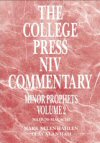
This second volume commentary on the Minor Prophets will be a helpful and reliable addition to your reference library. This volume contains the Minor Prophets from Nahum to Malachi.
The act of reading and interpreting the Bible requires contemporary readers to traverse from their world to the world of the text. However, a cultural distance between the two worlds complicates this journey. Biblical authors use images from ancient agriculture and warfare that are distant to modern readers. They refer to events, circumstances, geographical entities, and sociopolitical realities familiar to the text’s original audience, but not part of a frame of reference for contemporary readers.
Both general Bible readers and others doing in-depth biblical research should find helpful this volume for diminishing or closing the distance between the biblical audience and contemporary readers. As a result, they may better read, understand, and be challenged by the messages of the prophets.
Nahum, Habakkuk, Zephaniah, Haggai, Zechariah, and Malachi are the final six books in a 12-book collection often referred to as the Minor Prophets. This name refers to their relative brevity as opposed to their diminished significance. They circulated together with the first six books of the collection (Hosea, Joel, Amos, Obadiah, Jonah, and Micah) in an anthology known to the Jews as the Book of the Twelve, the final book in the section of the Hebrew Scripture known as the Prophets.
Clay Alan Ham has served as professor of New Testament and preaching at Dallas Christian College since 1988. He is also a visiting professor at Lakeview Bible Seminary, Chennai, India. Dr. Ham received his PhD from Southwestern Baptist Theological Seminary and his BA and MDiv from Lincoln Christian College and Seminary. He is author of The Coming King and the Rejected Shepherd: Matthew’s Reading of Zechariah’s Messianic Hope.
Mark Allen Hahlen has served as professor of Bible and language at Dallas Christian College and as a visiting professor at Louisville Bible College since 1992. Before that, he served on the faculty of Louisville Bible College from 1985 to 1992. Dr. Hahlen received his MDiv and PhD from Southern Baptist Theological Seminary and his BA from Johnson Bible College. He has held youth and preaching ministries in Tennessee, Kentucky, and Texas.
Reviews
2 ratings

Donnie
2/11/2020
Not a fan of the NIV but, this commentary will work for my favorite version the NASB and the ESV as well. I find this commentary is more objective than subjective and, doesn’t reflect the commentators thoughts or subjective matter but rather on what the Bible says not what we may want it to say.
Fred Robbins
6/29/2017